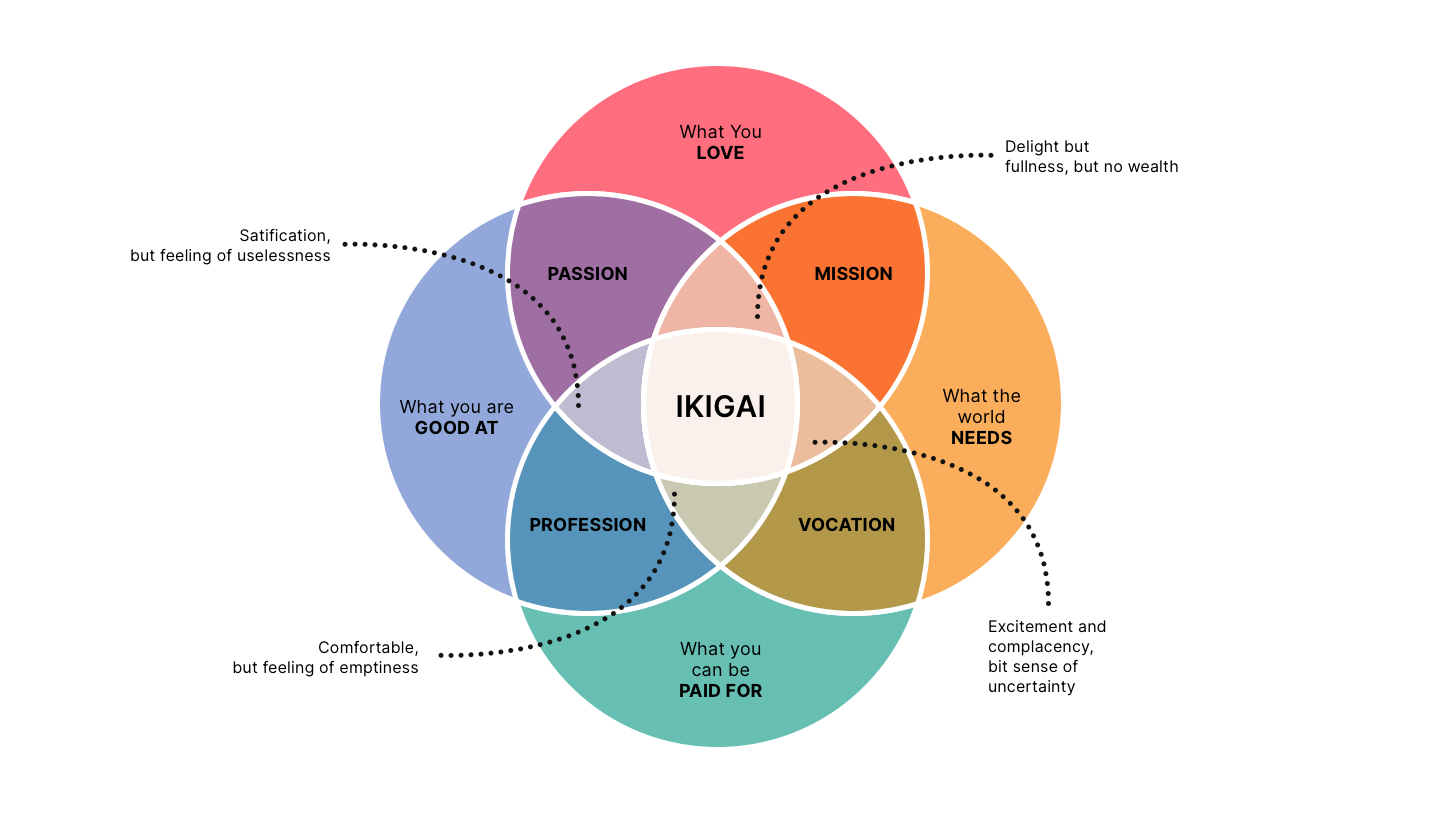Discovering Ikigai
On aligning purpose and meaningful work. Discover the power of Ikigai in entrepreneurship, a concept that helps you find purpose.
As entrepreneurs, we must have a clear vision for the business we want to create. This vision must capture the whole adventure. Without one, you will inevitably lose focus, lose sight of what matters to you, and quickly find yourself working on something that does not bring you joy.
Today I want to share a concept called Ikigai, which has helped me find fulfilment in my entrepreneurial expeditions. In this post, I’ll introduce the concept of Ikigai and show how it can help you build a purpose-driven enterprise.
London. Summer of 2004.
There’s nothing like summer in the city.
I had just turned 18, secured a place at university, and had tickets to my first proper music festival. I had a lot to feel good about. But before any summertime shenanigans could begin, I buried my head in Ian Marcousé’s Business Studies: Second Edition textbook, studying hard for my A-Levels.
In the run-up to my exams, I’d locked myself in the upstairs study, which I had exclusive access to. Day after day, I sat at an old Edwardian desk with all my notes and flashcards laid out. I vividly recall learning about Kaizen and Lean Manufacturing techniques, as their emphasis on efficiency, waste reduction, and self-improvement resonated with me. Often debating out loud with myself, this inspiring textbook would cause the technician inside me to stand up and pace, imagining a world where I use these techniques to run my future imaginary business.
Little did I know these many topics would stick with me throughout my working life as a web developer, as I would later learn these concepts significantly influenced the field of software engineering.
Working with Agile
When I started my first programming job in 2008, the management team was already hard at work introducing concepts like 5S (another JIT method) to improve the delivery process. So, there was great alignment when a know-it-all graduate arrived on the scene (me), advocating for Agile and running projects through sprints. I’d introduced ideas like burndown charts and quickly gained perspective on the real-life commercial aspects of delivering software in a digital agency.
In the 15 years that followed, most of my working life has been delivering projects with a strong bias towards Agile as it became a checkbox for RFPs and procurement processes. Through predominately WAGILE (Waterfall + Agile), I’ve helped structure work for numerous projects, itemising tasks and bugs into Kanban boards and tracking progress.
Of course, in this time, I’ve come to appreciate the realities of managing complex digital projects and that Agile is not a silver bullet.
Starting a Business
In 2021, armed with all my technical skills and hard-won project delivery experience, I quit my job to start my technical consultancy business. As I sat down to write a business plan for a bank loan, I found myself caught up in the almost unlimited possibilities of where I could take the business. How could I best use this money? The more market research I did, the more gaps I could see that needed to be filled. I couldn’t do all of them.
For my company to succeed at anything, I needed focus.
In search of sage wisdom, I was surprised to learn from a friend about another Japanese concept called Ikigai.
Ikigai roughly translates to “a reason for being” or “a reason to wake up in the morning” and represents the intersection of four key elements:
What do you love? ❤️
What are you good at? 🧠
What does the world need? 🌍
What would someone pay for? 💰
The idea: if you find activities or work fulfilling all four elements, you can find a real sense of purpose and meaning in life.
I was sceptical initially:
Can something as important as the meaning of life be handled by yet another neat concept similar to the ones that help shape my working life?
To summarise, the process itself is simply asking yourself these four questions and then finding the overlap:
Start by asking yourself what you love. What brings you joy and makes you feel fulfilled? It could be a hobby, work, or anything that gives you a sense of purpose.
Identify what you’re good at. What are your skills, talents, and strengths? What do you enjoy doing that you’re also good at?
Consider what the world needs. What problems or issues do you see in your community or the world? What kind of work could you do that would positively impact others?
Reflect on who and what people will pay for. How much money do you need? What kind of work could you do that would provide you with financial stability and security?
Look for the overlap between these four areas - what you love, what you’re good at, what the world needs, and what brings income and wealth. This intersection is your Ikigai or your reason for being.
Finding my Ikigai
I left that business plan blank. I needed to pay the bills, so I took on some freelance work doing what I instinctively knew I loved: building websites for people. I put my developer hat on, sharpened my tools, and got to work programming.
It wasn’t long, however, until I began to experience what Michael Gerber calls in his book The E-Myth Revisited, an “entrepreneurial seizure”. My ambition quickly outgrew what I could physically deliver. The business became an unsteady juggling act of managing the work, doing the programming, and winning new opportunities. On top of that, I was working on a separate high-growth startup venture, another distraction, so I was working 12+ hours a day on two businesses!
With all this self-inflicted stress, the novelty of being your boss wears off pretty quickly. Without focus, the freedom to build and do anything you want is overwhelming. It is easy to go through the administrative motions of setting up a business, but creating a clear vision for a successful company you want to work on, and staying focused on it, is much more challenging.
I knew I couldn’t sustain this effort. I took time to reflect on all the irons in the fire and narrowed my choices to one clear fork: should I reign in my lofty ambitions and be content with a ‘lifestyle business’? Or should I focus on building something great, with structure and process, a ‘growth business’ that could scale beyond just me?
So, I stepped back from what I was doing and shifted my thinking to “working on the business rather than working in the business”, creating a clear vision of what that might look like. A vision worth fighting for.
Here are some of my insights:
What do you love?
If you’ve ever visited a WeWork, you’ve probably held one of their branded mugs inscribed with the slogan, “Do what you love”. I’ve been meaning to steal one of these mugs. A cliché yes, but it is a powerful question to ask yourself each day: are you doing what you love?
I’m no Hitch: the reason for love is complex. Examining your inner child is an excellent place to start, identifying any themes or types of activities you’ve carried through life rather than just looking at what you’re doing now or paid to do. You could do this with a friend, taking 5 minutes to write down everything you love (or loved) to do, then talking through each one and seeing where that takes you.
Me? I love working with computers, building websites, and connective software with purpose over utility. However, despite the extent of automation today, there are parts that I would rather avoid doing. And there are other aspects where I have much better taste than ability, so I’d rather have someone better do it. So, if I wanted to build websites that matched my aspirational standard, the missing piece of the puzzle was a team—my very own quilt of Patch Workers.
What are you good at?
A better question might be, what are you good at right now?
We all have the potential to ‘get good’ at almost anything we put our minds to. In the 2008 book Outliers, Malcolm Gladwell asserts that it takes 10,000 hours (approximately ten years) of deliberate practice to become an expert in something. So, if you believe in “practice, practice, practice”, identifying all the activities you’ve already spent time challenging yourself in is a great start.
Start with a personal ‘SWOT analysis’. Write down all your achievements, merits, and what you have done, and self-evaluate your strengths and weaknesses. You may instinctively know what you’re both good at or an accomplished expert in. The things you can improve upon are your opportunities. Threats could be skills that are quickly becoming redundant or commoditised.
With a “growth agency”, it is essential to identify what you’re “not good at” early on and create a structure or organisational strategy to get someone in to do that work for you. And eventually, as you scale, you will have to step away from detail to some extent. Building a company is like building software, so I’m happy to delegate and oversee. Or, more accurately, an operating system. Its well argued that software architecture mirrors the communication structure of the people who build it (see Conway’s Law).
What does the world need?
The world needs you to solve problems.
We’re going to talk about solving problems a lot in this newsletter.
Taking a bottom-up approach, satisfying a world need through creating a business is an exercise in product or service market fit. Then, by consciously working through the value chain, you can evaluate the net benefit of your contribution and the industry overall to all people, communities, and the planet. Think B Corp movement.
A great business will aim to solve a profound and painful problem experienced by a sizeable population repeatedly. The more severe the pain, the more urgent the need for a solution. The more people it impacts, the larger the potential customer base. The greater the problem frequency, the more repeat business will drive growth and profitability.
How do you find these problems? One way to approach this is to research and segment an existing market today with a market mapping exercise. First, focus on a particular industry (e.g. live entertainment) and group together, and create relationships between the key players. Then, you can examine each product or service category and the underlying internal or philosophical problem the company is trying to solve.
At this point, you have a choice on how you contribute to the growth of this industry and perform further research to quantify where the business opportunity lies. Does the industry need (10x) better products or services than currently available? Or can you innovate and create brand-new product or service categories within the industry that solve painful problems?
Does the world need another digital marketing agency? Well, the world doesn’t necessarily need another run-of-the-mill digital agency, for sure.
The UK digital agency market continues to grow as agencies maintain a critical role in helping clients survive and thrive. The industry is constantly evolving and growing, and there is always room for new agencies to enter the market. The question is more about positioning yourself within the most valuable market map and helping clients with missions worth supporting.
What can you get paid for?
Job hunting is an essential entrepreneurial skill. I’m not necessarily talking about trawling through job ads in moments of anxiety and self-doubt, but the ability to systematically break down the “job to be done” by people, products, and services.
Now, if you’re in a full-time position, a deep understanding of your job purpose is critical to understanding how you add value to the company and ultimately negotiate compensation. Are you a replaceable part in a machine? Or are you deeply interwoven in the growth of sales, revenue-earning potential, and company future?
With a business, a strong correlation exists between how much you get paid and the perceived value you can provide your customer. Perceived as you will in good faith, either oversell or undersell your services, however hard you try. You create value for your customers by solving their problems consistently and continually and improving their lives with your product.
How do you find value? In a word, empathy: you talk to, listen to and understand your customer’s problems. This is a topic for another post.
How do you measure value? You combine empathy, problems and context. Like a web design process, prioritise the most painful problems in a requirements list and understand all the actors and scenarios involved. You create a rich picture of the problem space and an exact measure of the progress made if you solve this problem. You then draw a line between the progress and the commercial nature of the customer’s business: does this outcome increase or guarantee revenue?
How much money do you need? Treat this question seriously by developing your life aims and objectives (i.e. you have a specific number to reach). While always going after the most profitable opportunity is tempting, you may break your back for nothing if you only need half as much.
When do you need the money? Cashflow is essential, but it would help if you considered the pros and deltas between instant and deferred gratification. With a “lifestyle business”, for example, you reap the benefits of your labour within each tax year, minimising your tax burden as you go, and invest only the capital necessary to create value and make money for personal needs. Once you stop, however, the dividends stop, as you are likely the only value-generating aspect. A successful “growth business”, on the other hand, lives on and grows without you working “inside it” but requires much more investment up front. You also create jobs and income for other people, too.
Reflection
I have my Ikigai printed on A4, and pinned to a corkboard to remind me why I’m building a digital agency.
Like Kaizen, building a strong sense of purpose through Ikigai is an iterative process, nurtured rather than defined in stone. The more progress you make, the more you evolve with the changing world. Focusing on ‘your why’ and aligning yourself with these four questions help you align your actions and priorities with your true purpose.
One important thing to take away is that your purpose is different from your company’s purpose. In a future post, I’ll discuss why separating your primary and business objectives is essential when understanding your company’s vision.
What is your Ikigai? 🤔
Are you working on building a digital agency or business? What changes can you make to centre your purpose and lead an authentic life? Create a list of all your activities, business or pleasure, and work through the process. Share your Ikigai, or any thoughts, via email sealan@substack.com or comments.
I hope you find Ikigai beneficial in whatever situation you find yourself in.
Thanks a million,
Shay









